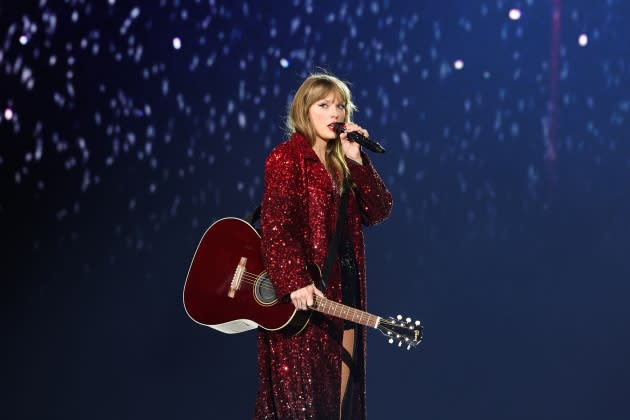With Ticketmaster Lawsuit’s First Hearing, Swifties Take to the Streets

Some of the Swifties who sued Ticketmaster and Live Nation after the much-bemoaned on-sale for Taylor Swift’s Eras tour took to the U.S. District Court in Downtown Los Angeles on Monday for their suit’s first hearing. They simultaneously held a small protest to air out their frustrations over a ticketing system they say is stacked against fans.
The hearing itself was on the court’s 8:30 a.m. docket and was less than 15 minutes long, pertaining mainly to scheduling matters as the court determines whether the case will enter arbitration or go directly to trial. That didn’t stop about a dozen of the over 200 plaintiffs on the case from coming out to court — some flying to L.A. from as far as Houston and Tallahassee — to show support. They called to break up Ticketmaster and Live Nation and chanted about fan unity. Some fans held signs that read “Can’t Shake It Off” or “Just Say No” with Ticketmaster crossed out.
More from Rolling Stone
Phoebe Bridgers Can't Shop Gushing Over Taylor Swift at the iHeartRadio Music Awards
Taylor Swift Says to 'Give Yourself Permission to Fail' as She Accepts iHeartRadio Innovator Award
She Escaped Scientology in the Trunk of a Car. Her Nightmare Is Far From Over
“The system is broken, it’s not working for fans,” says Julie Barfuss, a lead plaintiff on the case who came out to Los Angeles over the weekend from Salt Lake City for the hearing. “And fans are the reason for the live experience, they need to do better.”
Barfuss as well as the other plaintiffs are pushing for answers regarding high service fees and where they go, as well as how much money Live Nation has invested toward improving technology to kick out bots and withstand high fan volume without slowing down or crashing Ticketmaster’s system.
Barfuss says she tried 40 times to buy tickets in one day — the day tickets first went on sale — but tech issues prevented her from closing out on the purchase each time. The next day, she claims she tried buying tickets through Capital One’s on-sale, having gotten a Capital One card a week prior for the sale. However, Barfuss says the previous attempts the day prior stayed on her account even though she couldn’t close the purchase, and they added up to over $14,000, preventing her from buying tickets as her card was declined.
Live Nation didn’t respond to Rolling Stone’s request for comment.
Since the Swift-ticketing fiasco in November, the company’s been under increased scrutiny from ticket-buyers and lawmakers. Last week, Drake fans sued Ticketmaster following the on-sale for the rapper’s upcoming tour with 21 Savage. Live Nation is currently being investigated by the DOJ. In January, the Senate Judiciary Committee held a hearing on competition in the ticketing business, heavily probing Live Nation and president Joe Berchtold for over three hours.
The company has repeatedly denied the monopoly allegations. Live Nation has also pointed toward a bot attack that caused a severe bottleneck when addressing slow lines and fans getting kicked off the site during Swift’s on-sale. Berchtold and Live Nation apologized for the Swift-ticketing debacle.
Since February, the company has pushed for ticketing legislation through its FAIR Ticketing Act, which goes beyond Ticketmaster-related concerns and points toward issues more common on the secondary market. Live Nation has called to ban speculative ticketing strategies where scalpers list tickets they don’t actually own yet for sale, and has encouraged regulators to protect artists’ ability to limit resale on tickets so scalpers have less power to charge more. The company also advocated for increased enforcement of the BOTS act, a previously passed legislation that made using bots to buy mass amounts of tickets illegal. The act has only been enforced one time since 2016.
Some resale platforms like StubHub have criticized Live Nation’s call as a finger-pointing tactic to avoid accountability.
The fallout from the Swift on-sale has put ticketing issues more squarely in the conversation in the industry as some artists are looking for more solutions to keep fans from getting gouged. Zach Bryan, who scorned Ticketmaster for his upcoming Burn Burn Burn tour, rolled out non-transferrable tickets to stop customers from getting charged more from scalpers on the secondary market.
The Cure did the same and also rejected the use of dynamic pricing to stop price surges on the primary market as well. When some fans saw fees that amounted to more than their actual ticket price, Robert Smith spoke out, saying the issue with the fees had him “sickened,” and fans got partial refunds.
Although Smith and The Cure took additional steps to help keep tickets affordable for customers, fans still voiced frustration of high fees from Ticketmaster. Resale sites like VividSeats listed non-transferrable tickets as scalpers tried to sell turn a quick profit.
The next hearing on the Swift suit is slated for May 25th.
Best of Rolling Stone

 Yahoo Sports
Yahoo Sports 